When I was fifteen years old, I felt a tugging on my spirit, and not the kind frequently talked about by the youth pastors I’d had growing up—it didn’t feel like the Christian cliché of a “call on my life”. Instead, it resembled more of a responsibility on my life.
I was with my family in South Africa while my dad did research on his sabbatical from his job as a University professor. While he conducted his research, the rest of my family and I spent our time volunteering at a community development centre in a small township called Bhekulwandle. While we were in South Africa, I learned a lot about apartheid and the devastating effects that it had on the people who were forced into townships and impoverished. People were still struggling with the trauma of apartheid, which created symptoms of substance abuse and violence, worsened by the HIV/AIDS epidemic. Even though the apartheid was over, it really didn’t feel like it, and black people and white people were still very separated socially. When I returned home to Canada, I noticed that the same might be true of Indigenous communities on reserves here; although colonization was over, the living conditions and cycles of abuse persisted. Of course, I only knew this information by reading my textbooks, and had never actually met anyone who was First Nations, proving that my own country was just as racially segregated as South Africa.
It was through this experience that I began to feel a sense of responsibility. Before I understood this feeling, I might have said it was “a call from the Lord,” but really it was an awakening to an issue that I, my school curriculum, and the church culture I was a part of had been ignoring.
This is where the story begins to get more complicated, because I didn’t know what I was supposed to do with this sense of responsibility that I was feeling. I realized that I was a sixteen-year-old Canadian with no first-hand knowledge of Indigenous culture. My goal, I decided, would be simply to make Indigenous friends, and to figure out what the word “reconciliation” meant.
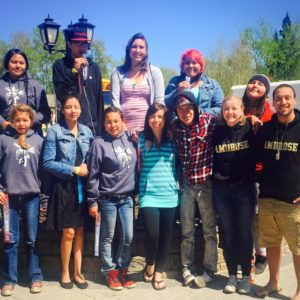
Amy Flater (top centre in pink stripes) and Kim Kakakaway (bottom centre in blue stripes), founders of Anchored Warriors, with their youth and volunteers at 2015 Native Youth Conference.
After months of phone calls and networking, I met Amy Flater, who ran a youth group called Anchored Warriors, for First Nations youth on Eden Valley Reserve in Alberta. Amy had started the youth group with her friends Kim Kakakaway and Dan Mayerle, after deciding to provide a follow-up ministry to the annual Native Youth Conference held in Alberta.
“We saw a lot of youth that wanted to change their lives,” says Amy, “but also saw that many of them did not have access to supportive relationships or programs in their different home communities.”
Though the program itself has changed a lot since its inception, the mission and vision of Anchored Warriors has never wavered; they aim to inspire youth through hope and change that impacts the heart of Aboriginal communities.
The first time I went to youth night, I was extremely nervous. I wondered who I thought I was, being white and going onto a reserve where I had never been before, to somehow “help” people. I was worried people would reject me, or think that I only wanted to be their friend out of white guilt rather than genuine desire to build relationship. However, on my first night there, all the kids made me feel so welcome. I realized that my worries about the evening were based on the exact racial trauma that I was trying to fight, and unknowingly, the youth took away some of the pain of Canada’s history by simply welcoming me into their space that night, and being open to friendship with me.
A typical youth night looks like this: we pick up two rental vans in Calgary, and make the hour and a half drive to Eden Valley, where a few of us get dropped off at a small wooden church to push the pews to the walls and turn it into our space where we can play games and eat together. While some of us are preparing, those in the vans go to the East and West sides of the reserves to pick up the kids and bring them back to the church. Often, as we’re setting up the church, kids will trickle in from the houses, and little ones will come asking if they’re allowed to stay. It always makes me so excited to see kids walking to the lit-up church knowing that something special is going on tonight. When the kids come, we play games, eat together, and then sit in a circle to share stories or lessons. We sit in a circle because it makes us equal; we are all learners and teachers. Considering the history of the trauma done to Indigenous peoples by the church through residential schools, talking about God or Jesus is a difficult and delicate task. When we do, we talk about how the Bible is full of tribal people, and make sure the youth know how much they are loved by our Creator, and how proud He is of the Indigenous people He created.
As I’ve grown closer with the youth, I’ve made some incredibly beautiful friendships. The kind that compel me to drive to Eden Valley alone to catch up with youth when it feels too long in between youth nights, or to see their babies, or to ask them if they’ll take me swimming in the river. I’ve been volunteering at Eden Valley for over three years now, and the youth of Eden Valley have truly given me a greater understanding of what real church is, as we share together, mourn together, learn together, and support one another.
Despite the progress I’ve seen as a volunteer with Anchored Warriors, racism against Indigenous people still exists. About a year into my volunteering, I was waiting for the CTrain on my way to school, and it was announced over the speakers that the train was running late. A woman standing next to me shook her head, glanced at me, and said, “Probably just some drunk Indian on the tracks.” I had no idea what to say to this woman. I literally had my textbook called “The History of Indigenous Peoples” in my backpack, and this woman had just said one of the most racist things I had ever heard; but as I looked at her, saw her white skin and her fancy bag as she headed to work at her downtown job, I realized that she represented my history. She looked like my family; people who went to college, got jobs in office buildings, had money… and I sort of saw my reflection in her. I’d been to the reserve and I’d taken classes, but standing with this woman I realized where I had come from and how much further there was to go, in my own life and in my own city. Again, I felt this responsibility to be aware, and to tread lightly as a white person in pursuit of reconciliation.
I’m so thankful that Amy’s ministry has given me a place to work on this pursuit, and reconcile with my own privileged upbringing in Alberta. Through Anchored Warriors I have been given the opportunity to meet people I would normally have never met, and my life has been completely changed because of it. As Amy says, working with Indigenous youth has “taught me more about God than I think I’ve taught them.” We hold our relationships with the youth in a place of deep honour in our lives.
But even still, there are times when reconciliation seems nearly impossible, in those moments when doubt creeps in and I ask myself what am I doing or who do I think I am. I wonder how we can possibly reverse the injustices that have been committed in the history of the church, and in the history of my country. I wonder what needs to be done so that our youth will stop committing suicide. This seems overwhelming, and sometimes I question whether my efforts at reconciliation are making a difference at all.
But then there are other times – as our van drives past the Eden Valley sign – when reconciliation seems easy, and it just looks like hanging out with friends. I have come to truly believe that reconciliation is most effective through relationships, on a person-to-person basis. I remember Amy once told me that probably the most important thing she has learned from being a youth leader is “to listen more than talk”. And so I listen, through ears, humility and friendship.
For more information about Anchored Warriors, visit their website.


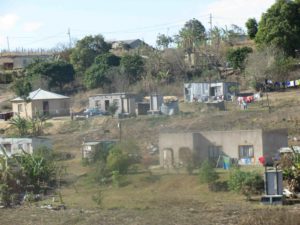
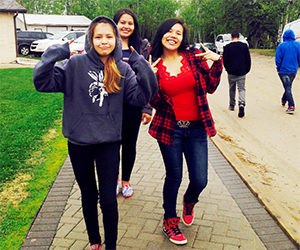
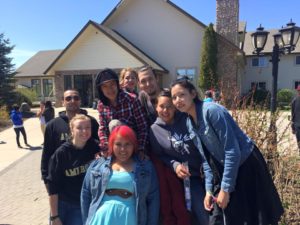
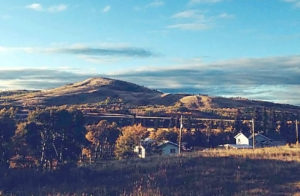






Written so well Alanna! I pray for you, Amy , Kim and of course the youth. So thankful that you understand the coming along side .. compassion & relationship ???? I am grateful for the love you share, I know it’s reciprocated.. but it takes a step forward on our part